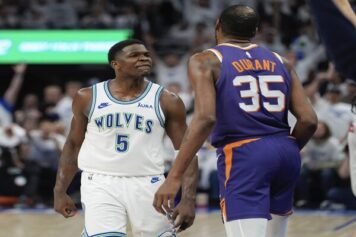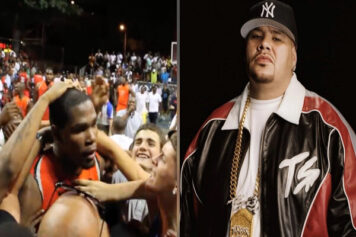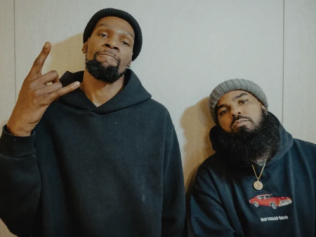NBA All-Star Kevin Durant recently took a page out Marshawn Lynchs book on how to deal with the media.
The soon to be free agent didnt hold back when letting media members at the NBA All-Star game know what he thought of them.
You guys really don’t know s–t,” Durant told reporters. To be honest, man, I’m only here talking to y’all because I have to. So I really don’t care. Y’all not my friends. You’re going to write what you want to write. You’re going to love us one day and hate us the next. That’s a part of it. So I just learn how to deal with y’all.”
Fast forward to last night when Durant took to Twitter to voice his opinion on a call against teammate Russell Westbrook.
That’s some bullshit
Kevin Durant (@KDTrey5) April 13, 2015
With those comments, Durant has joined the ranks of being a contentious objector. A narrative that is picking up steam by the day. Athletes are generally at odds with sports media. Durants comments show that he has spent time thinking about his own brand and how he wants it perceived. He now believes that he has the leverage needed to control the narrative that will leave many sportswriters on the outside looking in.
A high school football teammate of mine played in the NFL. He once told me something similar to what Durant said. He said the media and the fans have no idea what goes on with pro athletes. He went on to say that the media only knows what they allow them to know. When I hear stories like this, I think of what my old teammate was trying to tell me. He might have been saying that todays generation of athletes has zero confidence in sports journalists to tell the correct story.
During the Super Bowl XLIX media days a few months ago, Lynch answered all questions from the media by saying Yall know why Im here and Im here so I wont get fined.
The narrative that was pushed by many of the writers that Lynch spurned was one of a spoiled, self-centered brat.
Larry Foote, a linebacker with the Arizona Cardinals, believes that Lynch is going about it the wrong way. He believes the Oakland native can use his platform for good.
“You hear in the media, he always mentions his foundation and what he likes to do for the city of Oakland,” Foote told a Pittsburgh radio station. “I’m from the same type of urban environment (Detroit) that he’s from and the biggest message that he’s giving these kids, he might not want to admit it, is the hell with authority. ‘I don’t care, fine me, I’m gonna grab my crotch, I’m gonna do it my way.’ In the real world, it doesn’t work that way. It just doesn’t. How can you keep a job?
Foote went on to to say that Lynchs perceived petulance with the media is sending the wrong message.
“I mean, you got these inner-city kids, they don’t listen to teachers, they don’t listen to police officers, principals and these guys can’t even keep a job because they say ‘F’ authority.”
Social media lit into Foote for allegedly making comments that gave the perception of being subservient to white people — better known as being an Uncle Tom, two words no Black man wants to be associated with. I understood what Foote was trying to say. After all, thats not the norm for the rest of us. Speaking with the media is a part of job. Foote also opened the door for what Charles Barkley was trying to avoid all those years ago — the “pro athletes are role models” myth.
Like it or not, pro athletes are role models to some. Im not saying it’s right. However, it is a reality that we cannot escape. Children are impressionable. Foote envisions children using Lynchs catchphrases when dealing with authority figures in their lives. I can understand why he sees that as problematic.
On the other side of the spectrum, Lynch is widely regarded as an anti-hero who gives the establishment a preverbal middle finger. When the NFL started threatening to fine Lynch for his actions, they put themselves in an all too familiar position on being a hypocritical institution in light of recent events. Fans of Lynch began to see him as a sympathetic figure.
After all, when New England Patriots coach Bill Belichick can answer questions by saying Were onto Cincinnati repeatedly, that is looked upon in a much more flattering light. The same goes for San Antonio Spurs coach Gregg Popovich who routinely chastises reporters for the questions asked or, similar to Lynch, simply responds with the same generic response to all in attendance.
When I posted Footes comments on my Twitter feed and Facebook page, the debate raged on for hours. I watched friends and Twitter followers take sides. Many of them believed that Lynch was a victim of an overzealous media corps while Foote was viewed as telling Lynch how to act so white people wouldn’t be afraid of him.
Before I became a journalist, I thought the comments made by former NBA player Rasheed Wallace were hilarious. Fast forward to the present day. People believe that a majority of the white press is out to get the African-American athletes they cover.
Knowingly or unknowingly, Lynch and Foote are the new faces of how to deal with being Black in America. Throughout history, African-American athletes have either believed in being brash while others believed in going about their jobs without ruffling feathers or causing controversy. Our community tends to put these men it a box. For decades, African-American athletes have been pulled into the fray when it comes to issues of social justice. The best and the brightest we had to offer were athletes, actors or musicians. Pressure was constantly applied to these folks when something would come up.
The image of African-American males is one of the most polarizing predicaments in American history.
When Jackie Robinson broke into the Major Leagues, he was chosen by Branch Rickey for reasons other than being the best of the best. Robinson was a married man with a military background. He wasn’t the best of the Negro Leaguers, he was the most mature of the group in Rickey’s estimation. Robinson was able to withstand everything that came along with being the first.
For every Jim Brown, Bill Russell and Muhammad Ali there has been an Ernie Banks, Michael Jordan and Tim Duncan.
While the aforementioned athletes tried to figure things out, many of the people involved in the racial politics of the 60’s had their own ideas on how to change their surroundings.
Whether it was Martin Luther King or Malcolm X, there was a method to their madness. King used non-violent protest while America was introduced to the Nation of Islam and Malcolm X via a CBS News segment called The Hate That Hate Produced.
While King believed in the brotherhood of all men, Malcolm X initially pushed for a much more brazen approach. A division within the Black community developed because of the methods used. Some chose By Any Means Necessary while others sided with We Shall Overcome. That division continues to play out.
Even though Dr. King and Malcolm X often disagreed with each other’s tactics, they both agreed that our country has a problem that needed to be confronted.
I think Foote, Lynch and Durant can all agree with those sentiments.



